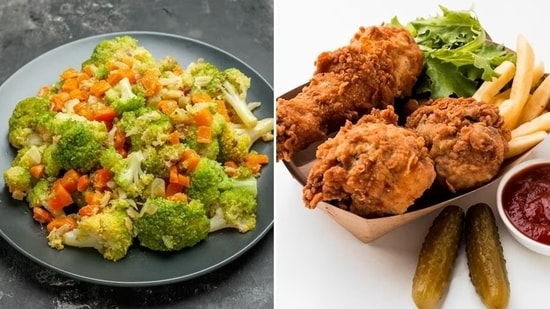Infection
Dos and don’ts of monsoon diet: Stomach infections on rise; what to eat and avoid in rainy season
Celebrate and rejoice while it rains but do not forget to follow these essential dietary dos and don’ts that could prevent risk of gut infections in monsoon.
Street foods be it pakora, samosa or chaat are much in demand in monsoon. The sudden hovering of the clouds followed by a spell of rain awaken all our senses to rejoice and we celebrate the dreamy weather with these delicious snacks. However, the joy could be cut short due to gut related infections that are quite common during these months and cause light to severe gastrointestinal problems. This can happen because of breeding of innumerable bacteria and viruses. Stomach cramps, diarrhoea, frequent of watery stools, vomiting, nausea, constipation are all tell-tale signs of stomach infections that one should watch out for. Most of these infections are cured on their own. It is advised to rest well, hydrate with hygienic water, and eat light and healthy meals while recovering. (Also read: Monsoon workout: 6 ways skipping rope can help you in losing weight)
“During the rainy season, stomach infection is seen due to the bacteria or virus that contaminates food or water. It is a self-limiting illness. People will fall sick and recover within a few days. The water gets contaminated with the bacteria or the virus. I see around 2-3 patients with stomach infections on a daily basis. This is a routine stomach bug infection (caused by bacteria or a virus),” says Dr Meghraj Ingle Director and Senior Consultant Gastroenterology Global Hospitals Parel Mumbai.
Symptoms of stomach infections in monsoon

Dr Ingle says symptoms like fever with chills for the duration of 1-2 days, abdominal cramps, diarrhoea or loose motions are common in most of the stomach infections. He however says these infections get rarely serious.
“Consumption of contaminated food with bacteria, toxins, and parasites may lead to gastroenteritis (an infection of the bowel also called as food poisoning or the tummy bug). Patients may develop other health problems like vomiting, nausea, gases, chronic constipation, ulcerative colitis, gastritis and gut sensitivity issues,” says Dr Bir Singh Sehrawat, Director & HOD, Gastroenterology, Marengo Asia Hospitals Faridabad.
What actually leads to these stomach infections

Dr Sehrawat says eating heavy foods in this season is not advised as they can slow down the digestion process which can result in bloating, gas, acidity and indigestion.
“Having chaat or juice from the streets may pose a risk of stomach infection as the water used to prepare it may contain bacteria. Drinking water from other sources apart from the sealed bottles and water purifiers can also make you fall sick and cause diarrhoea,” says the expert.
What is the best treatment to deal with stomach infections in monsoon?
“Take proper rest, ensure hydration with safe and hygienic water, and oral rehydration solution (ORS) if you are feeling too dehydrated. There are no antibiotics or medicines required to manage this stomach infection. Apart from that, one will also have to follow a well-balanced diet consisting of all the vital nutrients. One will recover from this infection in the next 3-4 days,” says Dr Ingle.
What to eat and avoid to prevent stomach infections
To avoid these stomach infections, one can also add healthy bacteria or probiotics to the diet. From buttermilk to kimchi, fermented foods are a must-have during rainy weather. Make sure to eat fresh food and avoid consuming stale items. Also, if you carry cut foods with you at workplace and do not consume them till later in the day, you could be at risk of getting these pesky stomach issues. Hence, it is advisable to have a well-balanced diet, exercise daily, avoid junk, spicy and oily food, and drink boiled water.

Dr Bir Singh Sehrawat shares dietary dos and don’ts to follow:
DO follow good hand hygiene to reduce the risk of infections.
DON’T eat seafood as the water gets contaminated during monsoon season. Here eating fish may make you prone to cholera or diarrhoea.
DON’T eat cut fruits from the roadside as they can be contaminated with bacteria.
DON’T eat green leafy vegetables as they will be loaded with germs. You should opt for lighter foods that are gut-friendly and can be easily digested.
DO incorporate ginger and lemon in the diet to boost digestion and immunity.
DO eat a lot of probiotics such as yogurt or buttermilk as they contain good bacteria that act on our digestive system and support the immune system.
DO take in plenty of water to flush out toxins from the body and improve digestion.
DO eat steamed or boiled vegetables instead of the raw ones to lower the risk of infection. The latter ones may be loaded with bacteria and viruses making it worse for your gut.
DON’T consume refined sugar as it may cause inflammation and upset the gut flora balance.
DON’T have fried and oily foods that lead to acidity and bloating.

